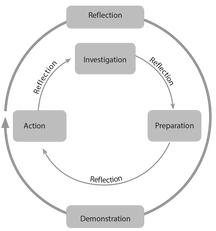Creativity, Action & Service (CAS)
The nature of CAS
'…if you believe in something, you must not just think or talk or write, but must act.'
~ Alec Peterson
'…if you believe in something, you must not just think or talk or write, but must act.'
~ Alec Peterson
 Click to enlarge - CAS Stages
Click to enlarge - CAS Stages
Creativity, Activity and Service (CAS) is a core component of the IB. The philosophy of the IB is to develop all areas of a student’s potential, to educate the whole person and to encourage each individual student to develop their diverse talents. The CAS programme acknowledges the world outside academic studies and recognises the need for students to become involved in sports, theatre productions, artistic pursuits, community service work and other spheres outside the academic. CAS provides opportunities for students to take part in and organise non-academic activities, often outside school. It also develops awareness, concern, and the ability to cooperate with others.
The CAS programme is overseen by the CAS Coordinator. Students allocate time to plan and organise activities. Over the two years of the IB programme, students must devote time to CAS activities.
Students must divide their activities equally between the three elements: Creativity, Activity and Service.
- Creativity – These types of pursuits may include music, art, drama and dance. Students whose timetable does not include art, for example, may find opportunities to develop their creative skills through this part of their CAS programme.
- Activity – These pursuits aim to keep students fit and physically healthy. Taking up a new sport or physical activity, coaching or organising a team are possible ideas. Going on an adventure - or an activity-based residential may also qualify here.
- Service – As the name implies, these activities are about giving something back to the community. Service may take different forms: for example participating in environmental clean-up campaigns or helping disadvantaged members of the community such as the disabled or the elderly. Students can gain a great deal from giving their time to help others.
CAS aims to develop student who: enjoy and find significance in a range of CAS experiences, purposefully reflect upon their experiences, identify goals, develop strategies and determine further actions for personal growth, explore new possibilities, embrace new challenges and adapt to new roles, actively participate in planned, sustained, and collaborative CAS projects, understand they are members of local and global communities with responsibilities towards each other and the environment.
CAS Stages
The CAS stages offer a helpful and supportive framework and continuum of process for CAS students as they consider what they would like to do in CAS, make plans, and carry out their ideas.
There are two parts as noted in the diagram above. The center represents the process with four key parts: investigation, preparation, action, and reflection occurring in response to significant experiences. The outer circle has two parts that guide students in reflection and demonstration of CAS experiences.
- Stage 1 - Investigation: Students identify their interests, skills and talents, as well as areas for personal growth and development, to be used in considering opportunities for CAS experiences. Students investigate what they want to do and determine the purpose for their experience.
- Stage 2 - Preparation: Students clarify roles and responsibilities, develop a plan of actions to be taken, identify specified resources and timelines, and acquire any skills as need to engage in the experience.
- Stage 3 - Action: Students implement their idea or plan. This often requires decision-making and problem-solving. Students may work individually, with partners, or in groups.
- Stage 4 - Reflection: Students describe what happened, express feelings, generate ideas, and raise questions. Reflection can occur any time during CAS to further understanding, to assist with revising plans, to learn from experience, and to make explicit connections between growth, accomplishment, and the learning outcomes for personal awareness.
- Stage 5 - Demonstration: Students make explicit what and how they learned and what they have accomplished. Through demonstration and communication, students solidify their understanding and evoke response from others.
Updated Sep'22


